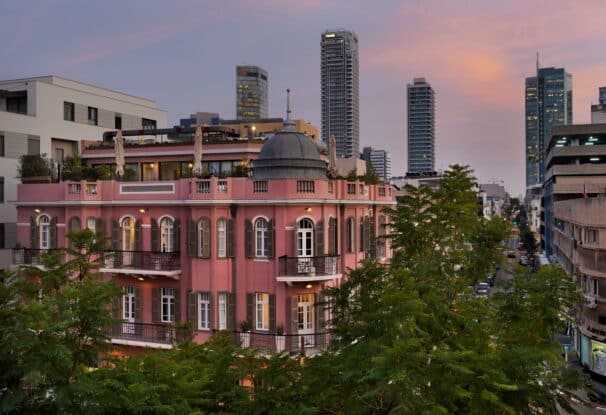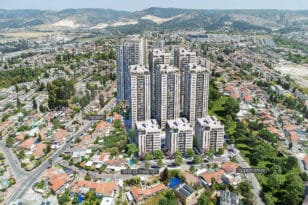Home buyers have stopped visiting sales offices and construction companies are dealing with debt. Yet, despite the turmoil that the housing market is going through as a result of the Coronavirus, developers would still prefer residential to hotels and commercial real estate. Are home prices are falling? Yes, but not for long.
With huge debt to banks and other financiers, buyers who are afraid to buy apartments under extreme uncertainty, construction workers who are unable to work on sites, and complications that may force developers to pay high compensation for delays (150% of the rental price), the housing market too has suffered a serious blow due to the Corona crisis. Contrary to what many stakeholders are trying to present, the market is definitely vulnerable and not immune to collapse as a result of (low) demand and (high) prices.
However, at least with regards to the events in recent weeks, there is no doubt that residential is the most stable in the real estate industry at the moment. Certainly, compared to other real estate classes such as office or retail, which may find themselves in a completely different world on the day after the pandemic. Unlike for example office space which relies on the opening and expansion of new businesses that need a workspace, the housing market, or the need for a residential roof, depends mainly on the population growth rate. This rate, at least for the time being, does not seem to be ending, unlike most Western world countries that have seen a drop from the rate of 2 children per family.
How stable and resilient is the housing market for the developers? A good example to answer that question: The Nordoy Hotel, located in Nahalat Binyamin, Tel Aviv, considered to be one of the most beautiful buildings in the city which has been operating as a hotel since 1925, one of the first hotels in the city, and which survived quite a few economic, security and other crises over the years. According to Calcalist, the owners, who just two years ago invested millions of shekels in renovating the hotel, are now planning to convert the property into residences, because of the dire effects that the Coronavirus has had on the industry. “It is with great grief that as a result of the Corona crisis the hotel owners now consider converting the building into luxury residences, as the existing city plan allows,” a spokesman for the hotel said. For years, in a popular city like Tel Aviv, hotels have generated double and even higher yields compared to residential property, which in turn has also led many apartment owners to convert their apartments into tourist rentals such as for Air BNB and others.
Further, about a month ago, the JTLV2 fund acquired control of Elad Residential, at a value of NIS 280 million, as part of Yitzhak Tshuva’s realization plan. Elad Residential is planning to develop 2,000 apartments in the cities of Tel Aviv, Rishon LeZion, and Jerusalem, 525 of which are already under construction; owns commercial areas in Or Yehuda and Kfar Saba, and about 40 dunams of agricultural land in Hod Hasharon held for future improvement.
The acquisition of control of such a company that specializes in the residential sector by a fund that has thus far focused on income-producing, commercial real estate is an extraordinary move by the fund, which is owned by Amir Biram, Ariel Roter, Shlomo Gutman, and Ze’ev Harel. ‘At the current time, office and retail space are more greatly exposed to risk, compared to the housing market which is more immune and less susceptible to instability” Rutter says.
The beginning of an awakening
In the meantime, since an exit from the Corona lockdown, there is an indication that the housing market is relatively immune and that buyers are slowly returning. Azorim, which sold 153 apartments in the first quarter, reported last weekend that from the end of the quarter until the release of reports, it has sold only 24 apartments. However, Azorim also noted that “as of the beginning of May and with the removal of restrictions, there has been a significant rise in demand for apartments in the company’s new projects, and until this writing, it has signed contracts for the sale of 72 apartments.”
In any case, there will likely be a long road to recovery. Y.H Dimri reported last weekend that it sold 22 apartments in May, higher than the April sales slump (16 apartments), but far from the November and December 2019 sales rate, when it sold 92 and 122 apartments, respectively. Dimri also emphasized that “in May and April the company did not reduce the sale prices of apartments relative to the prices preceding the crisis.”
Aura, which bears NIS 200 million in debt obligations until the end of 2020, also reassured investors a little this week when it reported that it had sold 38 apartments in May. “Fortunately for us, Aura is focused on residential real estate rather than offices, hotels, or commercials, so the crisis is relatively minor,” notes Jacob Atrakchi, owner of the company. “These days, when many people prefer to work from home and offices are closed, the housing sector, that is also in short supply, is the most stable and secure.”
But before we can declare the “most stable and secure sector” with confidence, the extent of the reduction in apartment sales in recent months is demonstrated in the recently published financial report of construction company Shikun Binui. The company notes that in the first quarter of 2019, 578 apartments were sold whereas only 67 apartments were sold in the first quarter of 2020. “During the reporting period, there was a decrease in the volume of sales to the extent that sales activities even ceased in certain cases, in light of the closure of sales offices and low customer traffic. In a few exceptional cases, there were even cancellations of sales transactions,” the report noted.
To counter the slowdown in the residential market, “which began even before the Corona period but intensified as a result of it” Shikun and Binui reported that “it is preparing for operations with various consumer clubs.” In a similar move, Aura, which has contracted with the Hi-Tech Zone Consumer Club, announced that it would offer average discounts of 300,000 NIS for members of the club.
The decline in the volume of transactions can also be learned from Minrav’s report. The company noted that “in the first quarter of 2020, sales growth slowed by 55% compared to the first quarter of last year. The decrease in revenues relative to the same period last year is mainly due to a decline in the residential development sector in light of the Corona crisis. Avraham Koznitzky, chairman of the Minrav Group, fears that contractors who fail to meet the delivery dates will be sued by buyers. ” He said, “Corona should be declared a ‘supreme power’, a declaration that will at least protect contractors from claims, which is more important than complicated calculations for compensation.”
Koznitzky emphasizes that, although the construction industry is recognized as ‘essential’ to the economy “the workforce dwindled, especially since it consists largely of Palestinian workers who were sent home, and at the same time the contractors’ overheads – office workers, field managers, and fixed expenses, continued to exist, so of course there was damage.”
According to Koznitzky, the difficulty with paying financing expenses during such a period affect mostly relatively small companies, which includes a major proportion of players in the real estate industry. For larger companies, the financial loss has been relatively minor, whereas the impact on small companies is measured according to each company’s situation and the relationships that it has with the banks. Anyone who is able to withstand the banks on existing agreements should not give up on those. Others may see that the bank is exploiting this situation to enhance itself. “
Real estate companies, Donitz Brothers and Ashdar explicitly conveyed in their reports an expectation that the crisis and its impact on the economy would lead to a fall in house prices – that is, in the short term. “In the Company’s estimation, the difficult economic situation and the rise in mortgage interest rates are hampering the purchasing power of home buyers and are expected to reduce actual demand” was stated in Donitz’s report for the first quarter of 2020. “Sales in the coming months will continue to be low and may even result in price declines in the short term. In addition, the company estimates that the faster the economy recovers, the faster sales growth is expected to increase. In addition, the difficult economic situation may impair the ability of recent homebuyers to pay the agreed price and lead to a cancellation of sales agreements. “
Ashdar wrote a similar forecast in the latest report noting that “in the first quarter of 2019, the company sold 206 apartments, compared with 150 apartments in the first quarter of 2020. From April 1 until the report’s release date, on May 26, the company sold 31 apartments, compared to 84 in the same period last year. “The slowdown in the pace of home sales could lead to a fall in prices in the short term. This could be the influence of homeowners who want to sell their apartments or as a result of developers and contractors who will offer apartments at lower prices than before.” Ashdar also noted that “the company believes that some buyers will postpone the purchase of apartments speculating that prices are going to fall”.
Ashdar CEO, Arnon Friedman emphasizes that during the Corona period, the company reduced its marketing and advertising expenses. “The most significant impact was on sales,” says Friedman. People were not allowed to go to sales offices, offices were closed and the willingness of buyers to execute transactions was greatly diminished. When the public’s willingness to purchase apartments is so low, there is no use in exerting marketing efforts. The faster the economy returns to accelerated economic activity, unemployment will decrease, interest rates will fall, and homebuyers will return to the market.”
“Build for the ultra-Orthodox”
Africa Israel Residences point to concerns about another wave of Corona: “Throughout the crisis period, the company refrained from investing budgets in advertising and marketing its projects,” the company report for the first quarter of 2020 noted. “The continuation or worsening of the Corona crisis, including due to a recurrence of the virus can continuously harm the company’s operations due to the possibility of a massive absence of manpower essential to carry out the work on the company’s sites, delay in receiving raw materials for construction, delay in project completion dates and delivery of apartments with possible exposure to cancellation of contracts or compensation claims”.
Africa Israel is also reminded that during the crisis the company was led to approach apartment buyers by publishing a “considerate mortgage” campaign in cooperation with Mizrahi Tefahot Bank, allowing the buyer to pay principal and interest payments only after two years, which of course represents a significant discount.
The Hanan Moore Group has already announced that it is delaying the publication of its reports and the possibility of the Securities and Exchange Commission to publish the reports by the end of June in light of the Corona crisis. Meanwhile, Hanan Moore, chairman and owner of the Hanan Moore Group, is trying to soften the blow in sales by marking the next target – housing for the ultra-Orthodox. “It is still early to draw full conclusions on the changes in the corona’s trends,” he emphasizes. “The challenge for these companies is to reduce the gap and recover from the slowdown that was created during the two-month crisis. In any case, these gains are not lost, they will be added to the 2021 forecasts. But the company’s next housing opportunity may be construction for the ultra-Orthodox. “
Not just malls: BIG Malls is going to build apartments
Those who find themselves reassessing their activities also include companies that deal with retail real estate. For them, the Coronavirus and the restrictions imposed have convinced them that they should give up on specialization and spread their risks.
Big Shopping Centers, for example, is advancing a plan in the planning committees to establish a shopping center in Ness Ziona. However, the plan is unlike the classic Big shopping centers, which include one-story of retail, offices upstairs, and six floors of residential comprising sheltered housing and regular residences.
“The area where the plan is being promoted is a new urban center, and the focus of the plan is for mix uses and connectivity to the surrounding area” explains Guy Kaplan Central District Planner for the District Planning Committee.
He said “According to the plan submitted, the sheltered accommodation will include 300 housing units and 200 small residential apartments. It was also decided that the retail space would be one-story and with an office floor above. It was decided not to approve a hotel on the complex, due to the lack of hotel demand in the area and the existence of a hotel in the Tamar industrial area, which is within a kilometer of the lot in question, meaning the plan will include commercial, office, sheltered housing, and small apartments.



